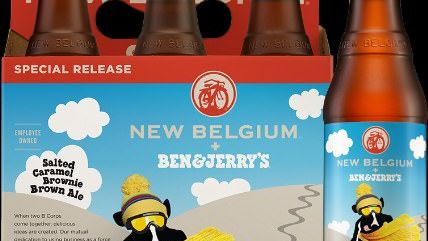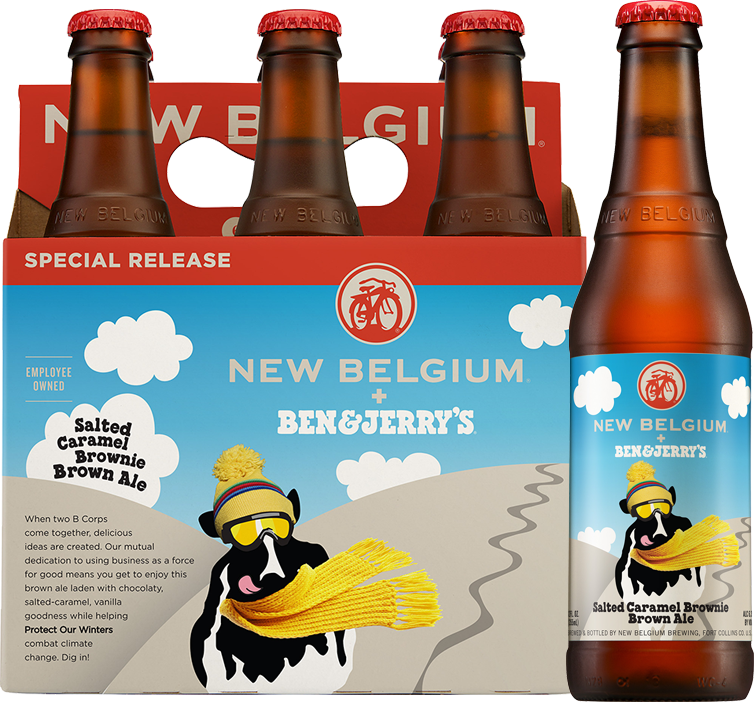Say Yes to Ice Cream-Flavored Beer
The only thing controversial about Ben & Jerry's and New Belgium's venture is that there's any controversy at all.


Last week, ice cream maker Ben & Jerry's and Colorado brewer New Belgium announced they would collaborate to create a new Salted Caramel Brownie Brown Ale, billed as "an ice cream infused craft beer."
This isn't the first beer pairing for Ben & Jerry's. Last spring, for example, the company kicked off a new product launch on the West Coast with a series of "frothy beer floats."
A press release announcing the partnership noted the beer will focus on the companies' shared efforts of "supporting sustainable agriculture" and "focus[ing] on environment awareness."
Wonderful. Or maybe not. Neo-Prohibitionists have jumped on the ice cream maker, warning of the potential harms of pairing a food kids like with a drink adults like.
"It's a crass, corporate greedy move to put a brand name like Ben & Jerry's on a beer," said Bruce Lee Livingston, executive director of the group Alcohol Justice, in remarks reported by USA Today. "It's bad for children—who will start looking at beer as the next step after ice cream."
I'd be surprised if ice cream-flavored beer appealed to anyone, let alone children, who are prohibited by law from buying the product. (Maybe it's my personal bias against anything boasting a salted caramel flavor.) But let's suppose Livingston is right, and the pairing is a gateway drug. If we assume that, why stop there? Let's take this sort of reasoning to its logical conclusions—and look at Ben & Jerry's ice cream itself.
Ben & Jerry's flavors like Hazed and Confused, an homage to 1993's weed-filled hit movie Dazed and Confused, clearly promote children's drug use. Cherry Garcia and Half Baked do the same.
Coffee Caramel Buzz and Coffee, Coffee BuzzBuzzBuzz! clearly promote childhood caffeine addiction.
Chocolate Therapy obviously promotes self-medicating for youngsters. Karamel Sutra, an ode to the Kama Sutra, the ancient Hindu text detailing various lovemaking positions, clearly promotes underage sex.
And with its White Russian flavor, an ode to the vodka-based cocktail of the same name, Ben & Jerry's has been promoting hard liquor use by children—obviously—since it was introduced in 2013.
Clearly. Obviously. Okay, maybe not really. Or at all.
Alcohol Justice, which attempts to "hold Big Alcohol accountable for the harm its products cause," urges a series of policies that target the rights of adult drinkers. For example, the group supports lowering the permissible blood alcohol content of drivers from .08 to .05. It wants to ban flavored beers, including Mike's Hard Lemonade, because they target "youth (especially girls)." It seeks to raise federal excise taxes on alcohol. And it wants to ban Palcohol, a powdered-alcohol product I wrote about here recently.
While Alcohol Justice claims to target "Big Alcohol," craft brewers like New Belgium, smaller competitors like Mike's Hard Lemonade, and tiny startup Palcohol hardly fit that description, not that anybody should feel differently about Alcohol Justice's arguments if they were simply opposed to alcohol being sold by bigger companies.
But even the littlest sellers appear to be targets of the group's ire. For example, Alcohol Justice recently fought a bill in California that would open up farmers' markets in the state to the scourge of wine tastings. Again, it's because of the children.
"Kids, you go on a pony ride while I taste the chardonnay, is what you might hear a parent say at your local certified farmers' market if AB 2488 becomes law," Livingston remarked in opposing the bill.
Among the warnings Alcohol Justice posted about the bill, which became law last year, are that "daytime tastings, with little to no monitoring, in family-friendly settings, are inappropriate and threaten public health and safety" and that "children watching parents drinking alcohol when they shop for fruit or vegetables is a practice very damaging to impressionable young minds."
It's all about the children, right?
Indeed it is. Livingston had previously referred to burger chain Red Robin's "mango Muscato wine shake" as "alcohol on training wheels."
Alcohol Justice isn't opposed to "Big Alcohol." It's opposed to alcohol, full stop. No one, including me, opposes efforts to keep alcohol out of the hands of children. But there's no justice in treating adult consumers of alcohol like children.


Show Comments (228)